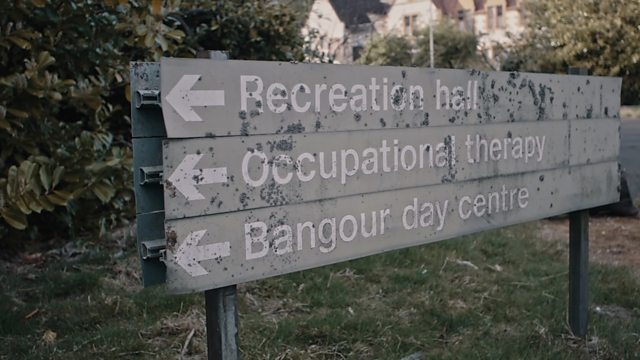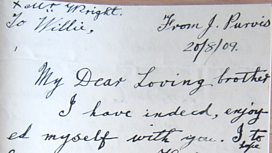
Graves of the Asylum
Author Jenni Fagan returns to Bangour Village Hospital to discover the history of the pioneering psychiatric hospital and explore the story of over 800 unmarked patient graves.
Author Jenni Fagan returns to Bangour Village Hospital to discover the history of the pioneering psychiatric hospital, hear experiences from those who knew it best and explore the story of over 800 unmarked patient graves.
More than 800 psychiatric patients who died in the care of Edinburgh District Asylum lay in unmarked graves in local cemeteries. Also known as Bangour Village Hospital, the sprawling German-inspired site ran for nearly a century from 1906 and is just 14 miles away from Edinburgh. Now derelict and about to be redeveloped into homes, it’s popular with dog-walkers, urban explorers and ghost hunters. But until recently the story of the graves had been lost, along with the names of those buried in them. Author Jenni Fagan has never forgotten Bangour. She was born in the psychiatric hospital before being taken into care and has been back to document the decaying buildings in poetry and film.
Now Jenni returns for one last time, hearing from the woman who found the graves of patients and fought to see them recognised. There are first-hand accounts of life in ‘the village’ from those who knew it best and digging in the archives for the forgotten stories of patients in unmarked graves.
Producers: Laurence Cook & Zoe Morrison
Last on
![]()
A letter from J Purvis to his brother
Clips
-
![]()
John Crichton
Duration: 05:00
-
![]()
David
Duration: 00:32
-
![]()
Gillian Allmond
Duration: 05:00
Jenni Fagan

Jenni Fagan is a poet and novelist. Her debut novel, The Panopticon, saw her named as one of Granta’s Best of Young British Novelists (2013), a once-in-a-decade accolade. She has recently adapted the screenplay of The Panopticon which will be put on by National Theatre of Scotland in 2019 and the film version is due to go into production in 2019 too.
Her work is published in ten countries, in seven languages. Available works include four published collections of poetry, two fiction novels, a film, anthologies and essays.
She’s written for ���˿��� Radio 4, The New York Times, The Independent, and Marie Claire among others and is currently completing a PhD with a critical thesis on Kafka.
Susan Swarbrick

Dr John Crichton

After his PhD, John was a clinical lecturer in Learning Disability at University of Cambridge before becoming clinical lecturer in Forensic Psychiatry at University of Edinburgh. In 2000 he became a consultant at the newly opened Orchard Clinic, Scotland’s first medium secure psychiatric unit and later supported the creation of the Forensic Mental Health Managed Clinical Care Network, becoming its Medical Director.
He created the ‘Matrix of Security’ and risk management traffic lights system – used across Scotland to enhance patient safety. John was instrumental in bringing about the national training program in Forensic Psychiatry. In 2017 John was elected Chair of the Royal College of Psychiatrists in Scotland and Vice President of the Royal College of Psychiatrists UK.
Dr Gillian Allmond

Dr Gillian Allmond recently finished a PhD thesis on colony asylums in Scotland and Ireland. Bangour Village formed a large part of this research and Gillian was particularly interested in the physical and material aspects of the asylum, for example, why the asylum was built where it was, how the buildings were situated in the landscape, and what motivated the choice of architecture, internal layouts, decoration and furnishings.
The research entailed several trips to Bangour which helped Gillian to understand the therapeutic effect that the asylum builders of the Edwardian period were trying to achieve. Gillian has published a paper in the journal 'History of Psychiatry' about Bangour Village and hopes to bring out further publications in the future.
Gillian's grandmother was a patient in the Argyll and Bute Mental Hospital for many months in the 1950s and 60s, with a diagnosis of schizophrenia, and Gillian attributes some of her interest in asylum history to an awareness from an early age of the impact of mental illness and institutionalisation on individuals and families.
Broadcasts
- Tue 11 Dec 2018 13:30���˿��� Radio Scotland
- Sun 16 Dec 2018 07:00���˿��� Radio Scotland




